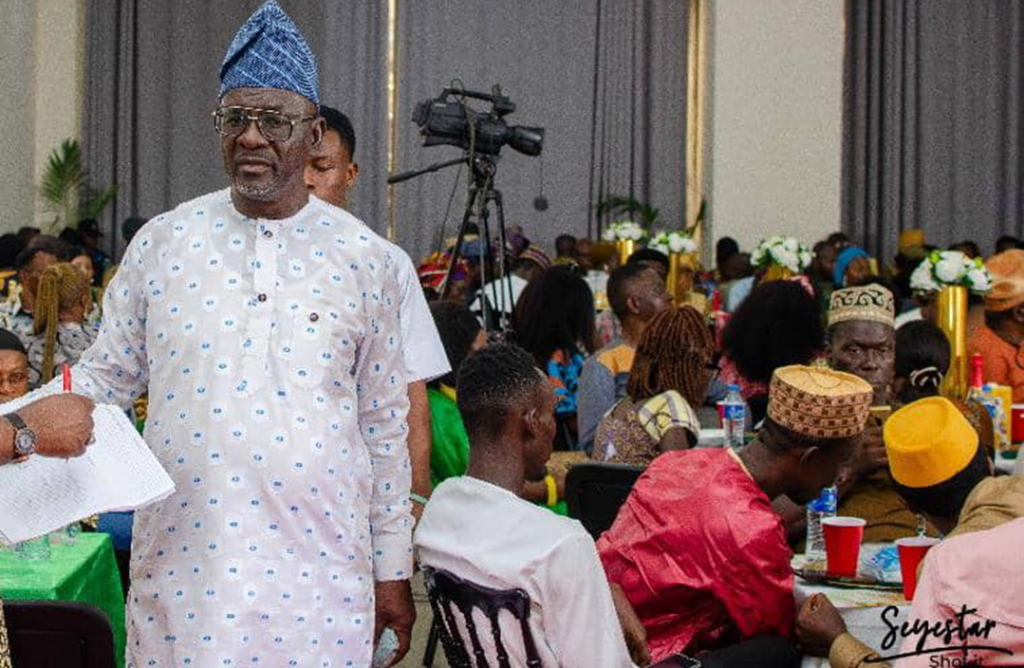By Alhaji Haruna Sani

The Yoruba Union in Sierra Leone hosted its inaugural Amala Day Festival on Sunday, 8th December 2024, at the New Brookfields Hotel in Freetown, marking a historic celebration of Nigerian culture and heritage.
The event attracted a wide array of dignitaries, including Engr. Abiodun Oyebola, President of the Nigerian Diaspora Organisation (NIDO) in Sierra Leone, and the Charge D’ Affairs of the Nigerian High Commission, who both delivered powerful and supportive statements.

He expressed the festival’s purpose of promoting unity and cultural pride, stating that it also provided a unique opportunity to introduce Nigerian delicacies, especially Amala, to the Sierra Leonean populace. “We are not just celebrating our food, but our heritage and the unity it brings to our communities,” Oki remarked, highlighting the importance of such cultural exchanges between Nigerians and Sierra Leoneans.
Miss Grace Olademeji, during her presentation, delved into the historical and cultural origins of Amala, a traditional Yoruba dish from southwestern Nigeria.
She shared that historians trace the origins of Amala to at least the 13th century, underscoring its deep connection to Yoruba culture.
Olademeji explained that Amala was first prepared by Aduke Agbedegbeyo of Abule Onipaki in Osun State during the reign of Sango, the Alaafin of Oyo, when Sango demonstrated his fire-spitting powers for the first time.
She further elaborated on the various types of Amala, which include, Amala Isu: made from yam flour, dark brown in color. Amala Lafun, made from cassava flour, white in color and Amala Ogede, made from unripe plantain flour, light brown in color.
The preparation process, according to Olademeji, involves stirring the flour into boiling water to create a smooth, dough-like consistency, and it is traditionally served with ewedu soup, gbegiri, stew (Abula), and assorted meats or fish.
She also highlighted the nutritional benefits of Amala, which is rich in carbohydrates, vitamins B and C, dietary fiber, and antioxidants, while ewedu provides essential minerals like calcium, iron, and potassium, supporting digestion, immunity, and overall health.
The festival also featured vibrant cultural performances from both Yoruba and Sierra Leonean troupes, showcasing the rich diversity of both cultures. The event was further enlivened by musical entertainment from Fullah Town and Fourah Bay, as attendees were treated to an energetic celebration of music and dance.
In recognition of the achievements of prominent Yoruba and other Nigerians excelling in Sierra Leone, awards were presented to individuals who have made significant contributions to their respective fields. The awardees, in turn, delivered heartfelt goodwill messages, reinforcing the importance of unity and collaboration between Nigerians and Sierra Leoneans.
As a part of the event’s focus on education and development, a vocational school project was formally launched by Nigerian officials. The vocational school, which will be constructed in the Four Mile area of Port-Loko District, aims to provide essential skills training for both Nigerians and Sierra Leoneans.
Officials highlighted that the school will offer training in various hands-on trades, fostering economic growth and improving livelihoods for individuals in the region.
The event was a resounding success, with officials and attendees alike expressing a renewed commitment to cultural pride and mutual cooperation.


